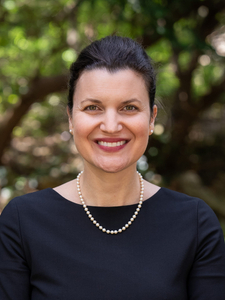Before summer break, my daughter’s class took an end-of-the-year field trip to a nature preserve. The trail guides gave the kids binoculars to spot wildlife and, in order to look through her binoculars, my daughter took off her glasses and tucked them into her shirt collar. At some point on their hike, her glasses fell from her shirt. And so a few hours later, I was now—yes, you guessed it—on a trail hike! Before she and I left to go look for the glasses, we had prayed as a family that we’d find them. Now my daughter led me along, and we retraced her steps.
Since her trip earlier in the day, it had rained hard. A couple of the trail guides had already gone back to look for the glasses but with no luck—and that was before the rain. So as she and I trudged along the muddy paths, I was trying to carry the mantle of hopefulness for our little two-member search party. “Look along the edges of the path!” “Keep praying!” “Keep your eyes on the ground!” But when we reached the end of the route that her class had traversed without spotting the glasses, discouragement started to set in. As we turned around to go the same way back and comb back over the same terrain, my daughter’s questions started.
“Why doesn’t God just send angels to show us where the glasses are?”
Good question! “He certainly could do that,” I replied cheerfully.
A few minutes later: “Why doesn’t God just end all the sin in the world right now?”
A deeper question—and much harder to answer! I could see her logic: a hardship like losing your glasses is connected to a world that isn’t fully redeemed.
We continued to talk and look, look and chat. And when we found the glasses several minutes later—yes, we found them!—I noticed that I felt a little disappointed. We were happy, of course, but a simultaneous feeling of disappointment after receiving the blessing of an answered prayer? Curious. Yet I understood it: finding her glasses meant we’d now head home and switch gears. With the glasses found, the tension she had been wrestling with—We’re praying. I know God can answer, but will he?—was resolved. My disappointment indicated just how much I valued that she was asking questions about her faith—so much so that I would’ve gladly kept looking for the glasses to give her more time to wrestle with that tension!
Yet it can be uncomfortable to wrestle with hard-to-answer questions, can't it? A child is still figuring life out, so that seems more palatable. But what about us as adults? How do we perceive asking questions about what we believe? Is it a lack of faith when we put words to our confusion about what God is doing in our lives? Is there value in voicing our questions?
Let me make a case for the value of it. When we ask questions, we engage with what we say we believe. It is natural, normal, and understandable to have questions about our faith. The very essence of faith is believing in what we can’t see (Heb 11:6). That’s not easy to do! We live in a world that’s not our home, where all things haven’t been made right. And in this place, trusting God is not a given. The hope is that greater trust comes on the other side of asking questions. And that is indeed the goal when we wrestle with our uncertainties: that our love for God would increase, and that, after our wrestling, we’d be left with a deeper sense that true rest will only be found with him. With that potential, we shouldn’t ignore, deny, or shun our questions or our doubts. They put us in good company:
Why, Lord do you stand far off? Why do you hide yourself in times of trouble? (Ps 10:1–2)
How long, O Lord, will you forget me forever? (Ps 13:1)
How long, Lord, must I call for help, but you do not listen? (Hab 1:2)
Why do you make me look at injustice? Why do you tolerate wrongdoing? (Hab 1:3)
Why are these anguished questions included in our Bible? It is because God values them.
And this biblical witness of God’s people asking hard questions is one reason we’d say that, in the midst of suffering, questions are natural, normal, and understandable. Because they are, we make space for them in our counseling conversations. Oftentimes people feel ashamed to have such questions rolling around in their hearts and minds. And so we invite people to speak them, not because we have easy answers to offer (we don’t), but because we don’t want people to bear the burden of them on their own. We invite hard questions because we want people to know they’re not failing as Christians because they are wrestling with what they believe about God in the midst of their circumstances.
So when you are struggling with doubts and hard questions, find a trusted person to voice them to, someone who will value them. Wrestle through them together. Pose them to God directly, as the psalmists did—and as Jesus himself did (Ps 22:1). And be encouraged that your questions are a sign of a living, engaged faith.
For times when you are listening and speaking to an anguished person, value their questions. Make room for them. Don’t feel pressure to give them a tidy answer, because there probably isn’t one. Instead, let the person know they can struggle in your presence. Cover any shame by letting them know that you have wrestled with doubts, too. Encourage their hearts: “Your questions remind me of what Jesus urged his disciples to do: to ask of their heavenly Father and to seek him” (Matt 7:7).
Last, when we are wrestling with hard-to-answer questions about who God is and what he is doing, let’s also pair them with prayers for greater faith. Let’s pray for greater trust in the One who holds the answers, but doesn’t always give them to us. And, in all times, no matter what you are wrestling with, trust that God is engaged with you. He doesn’t stand far off. He does not revile your doubts. Rather, your God is your refuge. He invites you to come closer and pour out your heart (Ps 62:8). He is listening. He values your questions. And when you seek him, you will find him (Matt 7:8).
So, what questions do you have about your faith?




